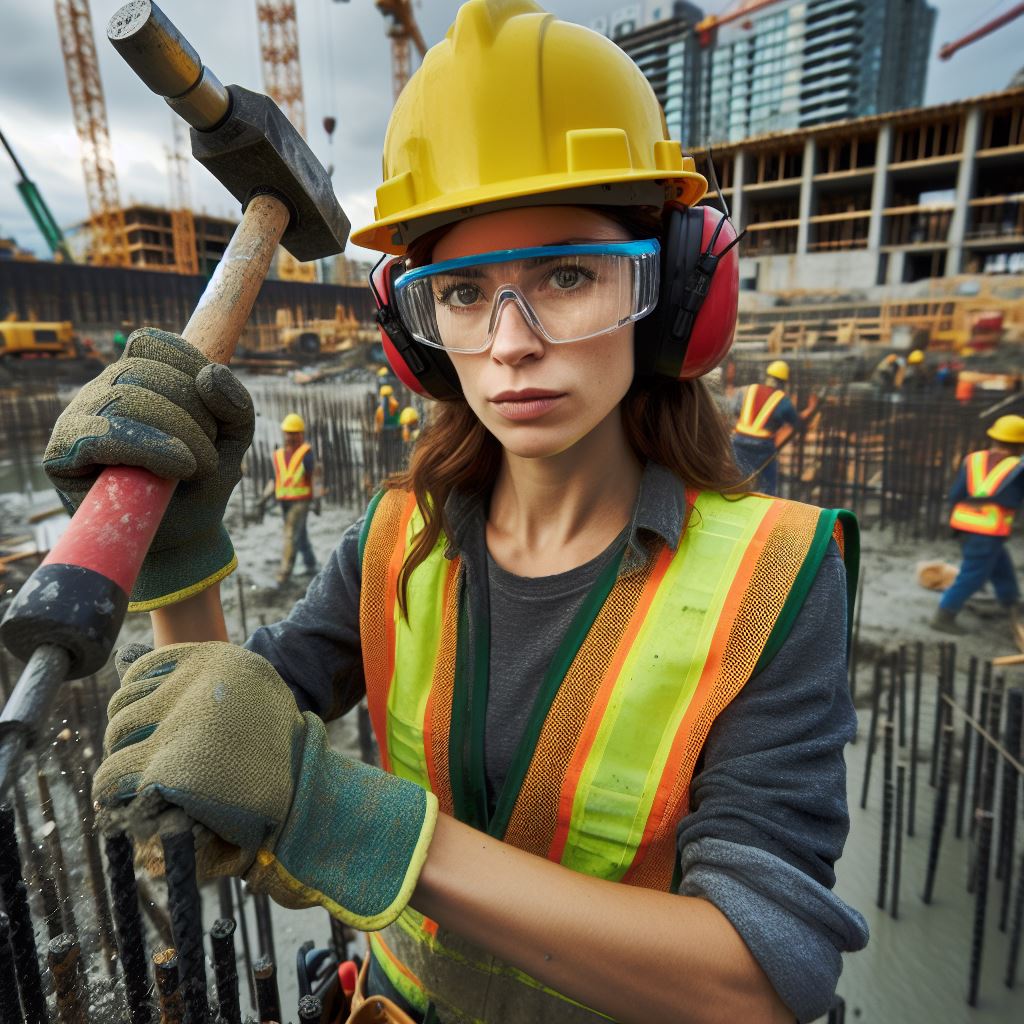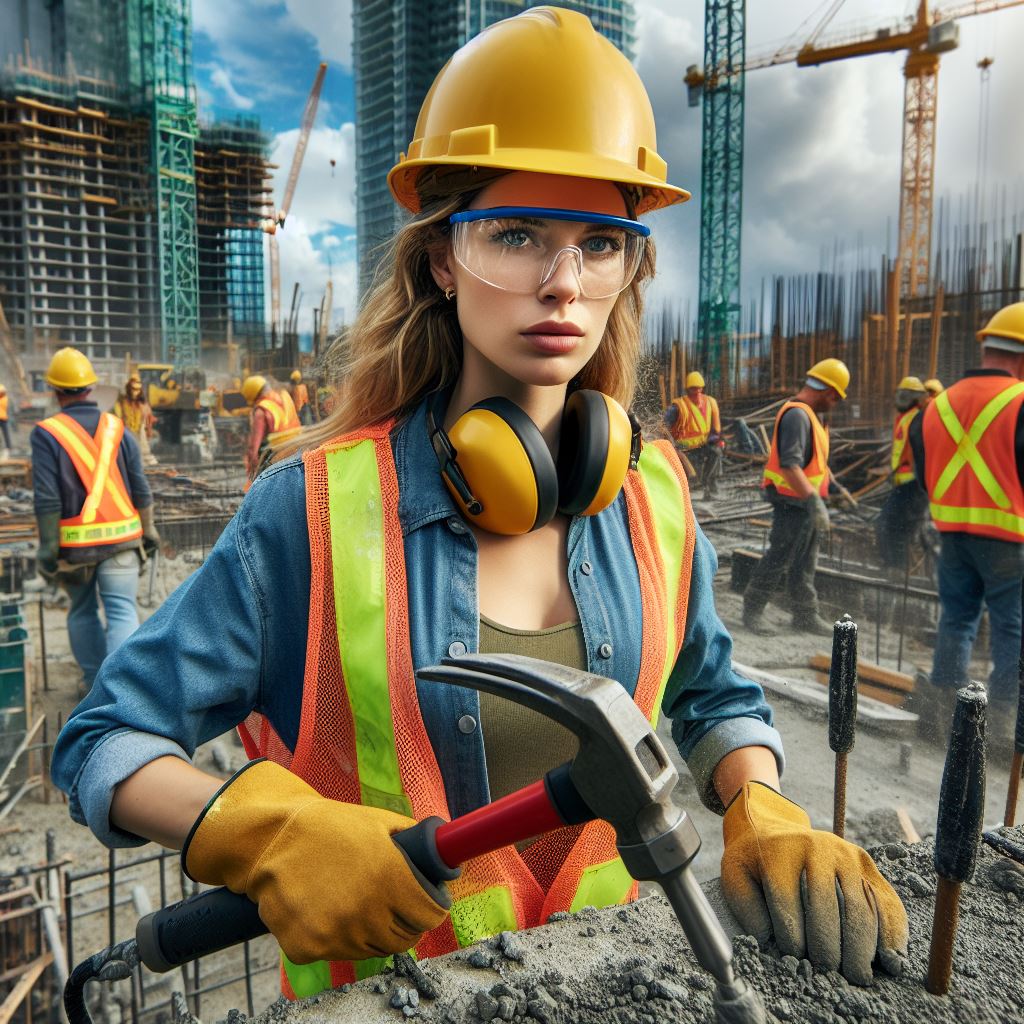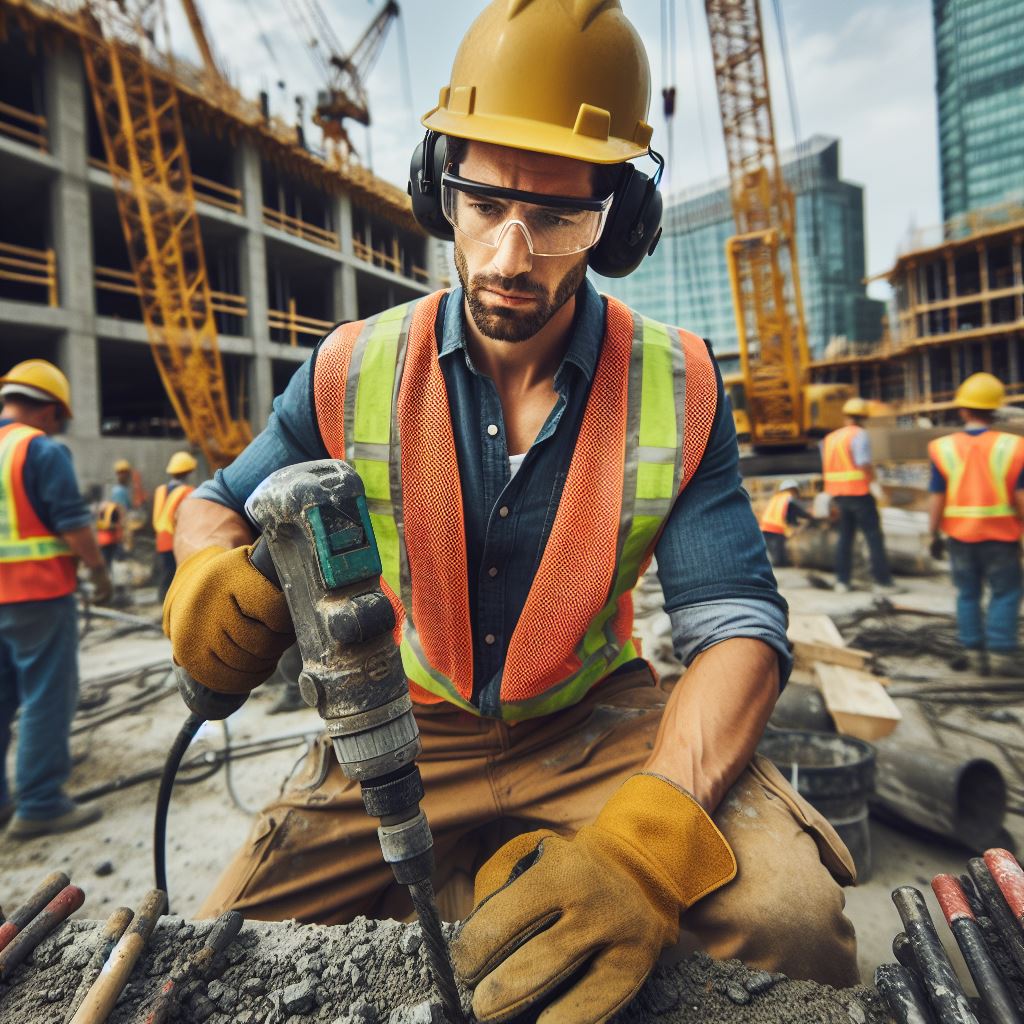Introduction
Understanding construction law is crucial for workers as it safeguards their rights and promotes a safe working environment.
This blog post aims to provide essential information to workers in the construction industry, empowering them with knowledge and awareness.
Embark on a journey through the multifaceted corridors of Construction Law, where legal intricacies intertwine with the very fabric of the construction sector.
As we unravel the layers, you’ll gain a profound understanding of the legal principles governing construction projects.
From contract formation to dispute resolution, this exploration aims to demystify the complexities, empowering workers with the knowledge to navigate legal challenges seamlessly.
We’ll delve into crucial topics such as compliance with building codes, worker safety regulations, and the contractual obligations that underpin every construction endeavor.
Understanding these facets is not merely about legal compliance; it’s about safeguarding your rights, ensuring fair compensation, and fostering a secure and productive work environment.
Moreover, in an industry where collaboration is paramount, a nuanced grasp of Construction Law can be a catalyst for successful partnerships and project execution.
Join us on this enlightening journey, arming yourself with the legal insights that will not only fortify your professional standing but also contribute to the overall excellence of the construction landscape.
Construction Law is not just a set of rules; it’s a tool for empowerment and a cornerstone for the sustainable growth of the construction industry.
Overview of Construction Law
Construction law refers to the set of legal rules and regulations that govern the construction industry.
It plays a crucial role in ensuring that construction projects are carried out smoothly, addressing any conflicts or disputes that may arise.
Relevance of Construction Law
Protection of the rights of construction workers
Construction law ensures that workers are treated fairly, receive appropriate compensation, and work under safe conditions.
Regulation of construction projects
Construction law establishes guidelines and standards that must be followed during the planning, execution, and completion of construction projects.
Resolution of disputes
If conflicts or disputes arise during construction projects, construction law provides a framework for their resolution, minimizing potential delays and cost overruns.
Contractual obligations
Construction law governs the creation and enforcement of contracts between various parties involved in a construction project, ensuring compliance with agreed-upon terms.
Liability and insurance
Construction law addresses issues of liability and insurance, ensuring that parties involved, including workers, are adequately protected.
Legal Framework for Construction Workers
The legal framework that governs the rights and responsibilities of construction workers varies across jurisdictions but generally includes the following:
Health and Safety Laws
Construction workers have the right to a safe working environment, and laws are in place to minimize accidents, injuries, and occupational hazards.
Employment Laws
Construction workers are entitled to fair wages, benefits, and working conditions as provided by employment laws.
Worker’s Compensation
If a construction worker is injured on the job, they may be entitled to worker’s compensation benefits to cover medical expenses and lost wages.
Unionization and Collective Bargaining
Construction workers have the right to form or join labor unions and engage in collective bargaining to negotiate better working conditions and benefits.
Dispute Resolution Mechanisms
If a dispute arises, construction workers have options for resolving conflicts, such as arbitration or litigation, to protect their rights.
Legal Remedies
If construction workers face discrimination, harassment, or wrongful termination, they have legal remedies to seek justice and compensation.
In short, construction law plays an essential role in safeguarding the interests of construction workers and ensuring the smooth functioning of construction projects.
Unlock Your Career Potential
Visualize a clear path to success with our tailored Career Consulting service. Personalized insights in just 1-3 days.
Get StartedIt provides a legal framework that establishes rights, responsibilities, and standards for all parties involved.
Construction workers should be aware of these laws, regulations, and their rights to work in a safe and equitable environment.
Read: Educational Paths for Aspiring Builders
Rights of Construction Workers
The various rights afforded to workers in the construction industry
In the construction industry, workers are entitled to various rights that ensure fair treatment on the job.
These rights include:
- Fair Wages: Construction workers have the right to receive a fair and reasonable wage for their work. This includes being paid on time and at least minimum wage.
- Safe Working Conditions: Workers should be provided with a safe and healthy working environment. Employers must implement safety measures to prevent accidents and injuries on construction sites.
- Protection Against Discrimination: Construction workers have the right to be treated fairly and equally regardless of their race, gender, age, or any other protected characteristic. Discrimination in hiring, promotion, or termination is illegal.
- Protection Against Harassment: Workers should not be subject to any form of harassment, including verbal, physical, or sexual harassment. Employers must take appropriate action to prevent and address harassment complaints.
The importance of understanding these rights to ensure fair treatment on the job
Understanding these rights is crucial for construction workers to ensure fair treatment and protect their well-being. Here’s why:
- Ensuring Fair Wages: By knowing their rights to fair wages, construction workers can advocate for themselves and ensure they are not being exploited or underpaid. This knowledge empowers them to negotiate better pay and benefits.
- Promoting Safety: Understanding their rights regarding safe working conditions allows workers to identify potential hazards and demand appropriate safety measures. This knowledge can prevent accidents, injuries, and even fatalities on construction sites.
- Fighting Discrimination: Being aware of their rights against discrimination enables construction workers to identify unfair treatment and take action accordingly. This not only promotes a more inclusive and diverse workforce but also helps in maintaining a positive work environment.
- Preventing Harassment: Construction workers who are knowledgeable about their rights against harassment can report any instances of inappropriate behavior. This helps create a respectful and supportive work environment for all workers.
To ensure construction workers are aware of their rights, it is important for employers to:
- Clearly communicate these rights through employee handbooks, trainings, and workplace posters.
- Establish procedures for reporting violations and provide channels for anonymous reporting.
- Take any complaints seriously and conduct thorough investigations.
- Enforce strict consequences for violations to deter further misconduct.
- Regularly review and update policies to align with legal requirements and best practices.
In fact, construction workers have various rights that protect their well-being, ensure fair treatment, and promote a safe work environment.
It is essential for workers to understand these rights to advocate for themselves and hold employers accountable for any violations.
Employers, on the other hand, must prioritize and uphold these rights by fostering an inclusive and harassment-free workplace.
Read: Seasonal Impacts on Construction Work
Responsibilities of Construction Workers
When it comes to construction law, understanding and fulfilling key responsibilities is vital for construction workers.
By following safety protocols, adhering to building codes and regulations, and fulfilling contractual obligations, construction workers play a crucial role in maintaining a safe and efficient construction site.
The key responsibilities that construction workers have under construction law
Following Safety Protocols
- Wearing appropriate personal protective equipment (PPE) is essential to ensure worker safety.
- Workers must undergo proper training to handle hazardous materials and use machinery safely.
- Frequent inspection and maintenance of tools and equipment should be performed to prevent accidents.
- Reporting any unsafe conditions or incidents immediately to supervisors is of utmost importance.
Adhering to Building Codes and Regulations
- Construction workers must have knowledge of local building codes and regulations.
- Ensuring compliance with these codes and regulations ensures the structural integrity of the building.
- Proper installation of electrical systems, plumbing, and other building components is crucial.
- Obtaining necessary permits and inspections from relevant authorities is mandatory.
Fulfilling Contractual Obligations
- Construction workers should understand and fulfill the obligations outlined in their contracts.
- Completing assigned tasks within the specified time frame helps maintain project schedules.
- Cooperating and collaborating with other workers and contractors is essential for a successful project.
- Ensuring high-quality workmanship and delivering the agreed-upon results is crucial.
The significance of fulfilling responsibilities to maintain a safe and efficient construction site
By fulfilling their responsibilities, construction workers not only protect themselves but also contribute to the overall success of the construction project.
Negligence in these areas can lead to accidents, delays, legal consequences, and compromised safety standards.
Furthermore, maintaining a safe and efficient construction site has several significant benefits:
Enhanced Worker Safety
By following safety protocols, construction workers minimize the risk of accidents and injuries on the job site.
This creates a safer work environment for everyone involved and reduces the chances of lawsuits or worker compensation claims.
Improved Productivity
Adhering to building codes and regulations ensures that the construction project progresses smoothly without interruptions or the need for costly rework.
This efficiency helps teams meet deadlines and prevents delays, ultimately saving time and money.
Enhanced Reputation
A construction company that consistently maintains a safe and efficient construction site earns a good reputation in the industry.
This positive reputation can lead to more projects and opportunities for growth as clients value reliability and professionalism.
Legal Compliance
By fulfilling responsibilities under construction law, construction workers ensure compliance with legal requirements.
This prevents potential legal complications and helps maintain a positive relationship with regulatory authorities.
In general, construction workers have key responsibilities under construction law.
Following safety protocols, adhering to building codes and regulations, and fulfilling contractual obligations are crucial for maintaining a safe and efficient construction site.
By understanding and fulfilling these responsibilities, construction workers contribute to the overall success of the project and ensure the well-being of both themselves and their colleagues.
Read: Navigating Electrical Code Changes in Canada

Contractual Agreements
The importance of contractual agreements in the construction industry
The construction industry heavily relies on contractual agreements for smooth project execution.
These agreements outline the rights and responsibilities of all parties involved.
They provide legal protection and establish the terms and conditions of the project.
Common types of contracts used in construction projects
One common type of contract used in construction projects is the subcontractor agreement.
Subcontractor agreements specify the tasks and services subcontractors are responsible for.
They also address payment terms, project timelines, and liability issues.
Construction management contracts are another commonly used contract in the industry.
These contracts assign a construction manager to oversee and coordinate the project.
The construction manager is responsible for hiring subcontractors and ensuring project completion.
Key elements that workers should be aware of within contractual agreements
Payment terms are a critical element in contractual agreements.
Workers should be aware of how and when they will be compensated for their work.
Contractual agreements also define the scope of work for each party involved.
Workers should have a clear understanding of their responsibilities and deliverables.
Dispute resolution procedures are another essential aspect of contractual agreements.
These procedures outline how conflicts will be resolved to avoid costly litigation.
They often include arbitration or mediation as alternative dispute resolution methods.
Workers should familiarize themselves with these procedures to protect their rights.
Contractual agreements may also address termination clauses and project delays.
Workers should be aware of the circumstances under which the contract can be terminated.
They should also understand how project delays can impact payment and other contractual obligations.
It is crucial for workers to thoroughly review and understand the terms of these agreements.
They should seek legal advice if they have any questions or concerns.
By understanding the contractual agreements, workers can protect their rights and avoid potential issues.
Overall, contractual agreements are vital in the construction industry.
They provide clarity, establish responsibilities, and protect all parties involved in the project.
Workers should take the time to comprehend these agreements to ensure a successful and smooth construction process.
Read: Future of Electrical Work in Canada: 2024 Outlook
Worker Safety
The significance of prioritizing worker safety on construction sites
Prioritizing worker safety is of utmost importance on construction sites.
When workers feel safe, they can focus on their tasks and perform better overall.
It is the responsibility of construction companies to provide a safe working environment for their employees.
The role of construction law in ensuring safe working conditions
Construction law plays a crucial role in ensuring safe working conditions.
It provides guidelines and regulations that must be followed to minimize accidents and injuries.
Construction companies are legally obligated to comply with these laws to protect their workers.
There are several key safety regulations and standards that every construction worker should be familiar with.
These regulations cover various aspects of construction work, including personal protective equipment (PPE), fall protection, hazard communication, and equipment safety.
Key Safety Regulations and Standards
- Personal Protective Equipment (PPE): Construction workers should always wear appropriate PPE, such as hard hats, safety glasses, gloves, and steel-toed boots.
- Fall Protection: Working at heights is a common aspect of construction. Fall protection measures, such as guardrails, safety nets, and personal fall arrest systems, must be in place to prevent injuries.
- Hazard Communication: Construction sites often involve the use of hazardous materials. It is essential for workers to understand the labeling and safety data sheets (SDS) of these substances to avoid accidents.
- Equipment Safety: Construction equipment can be dangerous when not used properly. Workers should be trained on equipment operation and follow safety protocols to minimize the risk of accidents.
Being aware of safety hazards and knowing how to report them is essential for every construction worker.
Here are some tips to help workers identify and report safety hazards:
Tips for Identifying and Reporting Safety Hazards
- Stay Vigilant: Pay attention to your surroundings and be observant of potential hazards.
- Regular Site Inspections: Participate in regular site inspections to identify any safety issues that need to be addressed.
- Report Hazards Immediately: If you identify a safety hazard, report it immediately to your supervisor or safety officer.
- Use the Correct Reporting Channels: Follow your company’s safety reporting protocols to ensure hazards are properly documented and addressed.
- Document Incidents: If you witness an accident or near miss, document the details to help prevent future incidents.
- Participate in Safety Training: Take advantage of safety training programs offered by your company to enhance your knowledge and skills.
By prioritizing worker safety, construction companies create an environment where employees can thrive without compromising their well-being.
Construction law serves as a crucial tool in achieving this goal by establishing standards and regulations that protect workers.
It is essential for workers to be familiar with safety regulations and actively participate in identifying and reporting hazards.
Together, we can ensure that construction sites are safe and conducive to productivity.
Delve into the Subject: Mobile Welding: A New Era in the Industry
Legal Remedies for Workers
Construction workers are often exposed to hazardous conditions and face the risk of injuries or rights violations.
In such cases, it is crucial for workers to be aware of the legal remedies available to them.
Understanding Legal Remedies
Construction workers have the right to a safe and healthy work environment.
If their rights are violated or they suffer from incidents of negligence, they can seek legal remedies to protect their interests.
Filing a Complaint
The process of seeking legal recourse begins with filing a complaint.
Workers should document any incidents or violations, including photographs, videos, or written statements, to support their claims.
- Make sure to include relevant details such as dates, times, locations, and descriptions of the incidents.
- File the complaint with the appropriate authorities, such as the Occupational Safety and Health Administration (OSHA) or the state labor department.
- Follow the prescribed procedures for filing a complaint, ensuring all necessary forms and documents are provided.
- Keep copies of all filed documents and correspondence for future reference.
Importance of Documentation
Documenting incidents and gathering evidence is crucial to provide a strong foundation for potential legal proceedings.
Workers should:
- Keep a detailed record of all incidents, injuries, or rights violations they witness or experience.
- Take photographs or videos of the scene, if possible, to supplement their written accounts.
- Collect any relevant documents, such as safety reports, medical records, or witness statements.
- Make sure to document any conversations, meetings, or discussions related to the incidents or violations.
Seeking Legal Recourse
Once a complaint is filed, construction workers can explore various legal options to seek recourse.
The available remedies may include:
- Mediation or arbitration: It involves a neutral third-party facilitator who helps resolve the dispute.
- Lawsuits: Workers can file a lawsuit against their employer, contractors, or other responsible parties.
- Workers’ compensation: In cases of workplace injuries, workers may be entitled to receive compensation for medical expenses and lost wages.
- Pursuing criminal charges: If the incidents involve severe rights violations, workers can seek criminal charges against the responsible individuals.
Consulting with an Attorney
Given the complexity of construction law, it is advisable for workers to consult with an experienced attorney specializing in labor and construction law.
An attorney can provide guidance, assess the strength of the case, and represent the workers’ interests during legal proceedings.
In a nutshell, construction workers have legal remedies at their disposal to address rights violations and incidents of negligence.
Moreover, by documenting incidents, filing complaints, and seeking legal recourse, workers can protect their rights, ensure a safe work environment, and hold responsible parties accountable.
Conclusion
Understanding construction law is crucial for workers in the industry.
Moreover, by being aware of their rights and responsibilities, workers can protect themselves from potential legal issues.
It is important for workers to stay updated on relevant laws and regulations that govern their work.
This can be achieved by regularly reviewing construction laws and seeking legal advice when needed.
Staying well-informed will not only safeguard workers’ rights but also help them maintain a safe and productive work environment.
Ultimately, by being proactive and knowledgeable about construction law, workers can contribute to the success and longevity of their careers in the construction industry.




